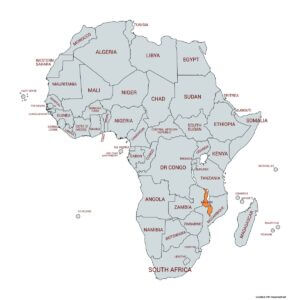- 关于邀请出席委内瑞拉帕 03-20
- 关于邀请参加CEEC第三届 03-04
- 关于邀请出席澳大利亚视 01-24
- 公告 11-18
- 关于邀请出席第二届中国 09-05
- “数智引领未来”能源大 06-30
- 墨西哥贸易与投资机遇论坛 06-19
- “绿能”擦亮中国能建金色 06-18
- 中海协陪同伊拉克代表团考 05-23
- 中国-伊拉克商务合作座谈交 05-19

Country overview: Malawi is a landlocked country located in Southern Africa. It shares its border with Zambia to the west, Mozambique to the east and south/ southwest and Tanzania to the north and northeast. It gained independence from the United Kingdom on 6 July 1964. It is a Presidential Republic with its President sitting as the Head of State and government. Its capital is Lilongwe and has an administrative structure divided into 28 districts. It runs a unicameral National Assembly which serves as the legislative arm of the government. English is the official language while Chewa is the common local language. Christianity is the major religion. It has a mixed legal system that includes English common law and customary law. It has an area size of 0.118 million sq km.
Demographic Information: Malawi has an estimated population of 21.2 million comprising mostly of younger population (less than 25 years) which makes up about 66.4% of the population, those in the age bracket of 25-64 years makes up about 30.9% of the population and above 65 years age group makes up about 2.7% of the population. Average population density is estimated at 203 inhabitants/km2. In terms of human development indicators, it has a life expectancy of 65.3 years (Women) and 61.2 years (Men). It achieved universal primary education with a 144.81% Primary enrolment rate in 2019 and overall literacy level of 62.1% as at 2015.
Broad Economic Overview: Malawi’s economy is mainly dependent on agriculture (tea, coffee, tobacco). Agriculture accounts for about 30% of GDP and 80% of export revenues. Tobacco alone accounts for 50% of exports. Other revenue-generating agricultural produce include tea, coffee, sugarcane, cotton, sorghum, potatoes, and corn (maize). Malawi has no precious metals or oil (except for ruby and uranium). Despite that Malawi economy was hit hard by the El Nino-driven drought in 2015/2016 and effects of cyclone Idai in 2019, real GDP grew an estimated 4.5% in 2019, up from 2.9% in 2015. It has consistently achieved a modest GDP growth in the past 5 years having grown 3.6% (5yr compound annual growth rate) over the period. Remittances by expatriate workers (6% of GDP) will continue to positively contribute to the economy. Its currency is Kwacha. Main export includes tobacco, Cotton, Coffee, tea, peanuts, Sugar, dried legumes etc. Major imports include petroleum product, foodstuff, machinery, consumer goods, transport equipment etc.
Investment Opportunities: Malawi relies on foreign seaports (Dar es Salaam in Tanzania and Nacala and Beira in Mozambique) for external trade. Trades are characterized by laws banning exports, inadequate diversification, and value addition. Malawi is presently considering a Bill to create a Special Economic Zones (SEZs) that will fast-track industrialization and result in sustainable economic growth and development. The SEZs is meant to strengthen value addition. Through the Special Economic Zone (SEZ) Bill, regulation of exports through a national export strategy may be achieved. The bill proposes multiproduct SEZs for oil seeds, sugar cane, beverage manufacturing, and agro processing. Malawi will also prioritize exports of tea, legumes, oil seeds, and minerals. Government of Malawi from time to time specifies focus areas for investment. Currently, the Government has prioritized the following sectors: manufacturing, agriculture & agro-processing, tourism, infrastructure, and ICT.
相关热词搜索:
上一篇:几内亚投资环境介绍
下一篇:毛里求斯投资环境介绍